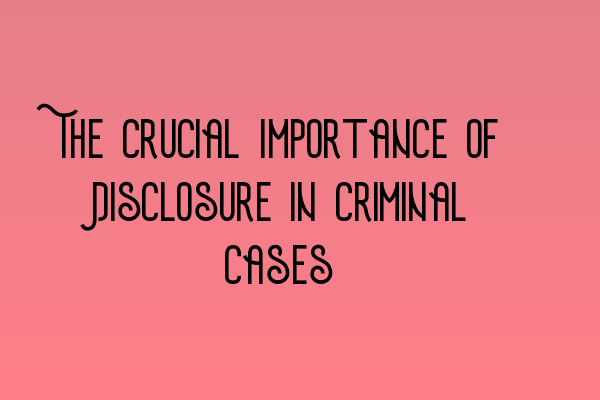The Crucial Importance of Disclosure in Criminal Cases
Disclosure plays an integral role in the criminal justice system, ensuring a fair and just outcome for all parties involved. In criminal cases, disclosure refers to the process of sharing information between the prosecution and the defense. This exchange of evidence is essential for the defense to prepare their case adequately and for the prosecution to meet their duty of disclosure.
As SQE 1 preparation becomes increasingly important for aspiring solicitors, it is crucial to understand the significance of disclosure within criminal law and practice. In this blog post, we will explore why disclosure is essential, its impact on criminal cases, and the responsibilities of both the prosecution and the defense.
Why is Disclosure Essential?
Disclosure ensures that both the prosecution and the defense have access to all relevant evidence in a criminal case. This principle promotes transparency, fairness, and the pursuit of truth. Without full disclosure, there is a risk of injustice, wrongful convictions, and compromised legal proceedings.
From the defense’s perspective, disclosure allows them to adequately prepare their case, evaluate the strength of the prosecution’s evidence, and identify any weaknesses or inconsistencies. The defense can also gather their own evidence and witnesses, enabling them to challenge the prosecution’s case effectively.
On the other hand, disclosure benefits the prosecution by ensuring they fulfill their duty to disclose all relevant evidence to the defense. This obligation is rooted in the principle of fairness and the prosecution’s duty to act in the interests of justice. By sharing all relevant evidence, the prosecution promotes an open and transparent criminal justice system.
The Impact on Criminal Cases
The impact of disclosure in criminal cases cannot be overstated. It directly influences the fairness and integrity of legal proceedings. When disclosure is mishandled or inadequate, it can lead to severe consequences, including wrongful convictions, wasted resources, and loss of public trust in the justice system.
Proper disclosure ensures that all parties have access to the same information, allowing for a level playing field. This ensures that both the prosecution and the defense can present their best possible case based on all available evidence. It also minimizes the risk of surprises during trial, as both sides are aware of the evidence beforehand.
Furthermore, disclosure encourages early resolution and plea bargaining. When both parties are fully aware of the strength of the evidence, it may lead to more informed decisions regarding whether to proceed to trial or seek a plea agreement.
The Responsibilities of the Prosecution and Defense
Both the prosecution and the defense have specific responsibilities when it comes to disclosure in criminal cases.
The prosecution, as the party bringing the case, has a duty to disclose all relevant evidence to the defense. This includes both evidence that supports the prosecution’s case and evidence that may undermine it. The prosecution must ensure that the defense has access to all evidential material in a timely manner, allowing the defense to prepare their case effectively.
Similarly, the defense has a duty to provide full and proper disclosure of their own case to the prosecution. This includes identifying witnesses, providing supporting documents, and disclosing any potential defenses or mitigation factors.
By fulfilling their disclosure obligations, both the prosecution and the defense contribute to a fair and transparent criminal justice system, ensuring a just outcome for all parties involved.
To conclude, disclosure is of utmost importance in criminal cases. It underpins the principles of fairness, transparency, and the pursuit of justice. The proper exchange of evidence between the prosecution and the defense allows for a level playing field and enables both parties to present their case effectively. Understanding the significance of disclosure is vital for aspiring solicitors preparing for the SQE 1 Practice Mocks and SQE 2 preparation courses. By promoting proper disclosure, we contribute to a robust criminal justice system that upholds the values of fairness and integrity.
